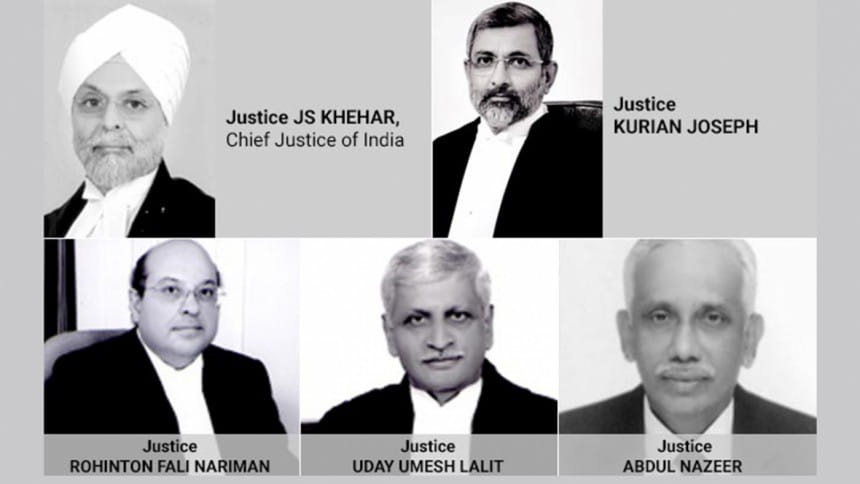India Triple Talaq: 5 judges, 5 faiths, what they said

An Indian Supreme Court bench consisting of five senior most judges, all of different faiths, today declared the Muslim practice of triple talaq or instant divorce by uttering "talaq (divorce)" three times "illegal and sinful", reports Times of India.
The judges who are from major faiths India -- Hinduism, Christianity, Islam, Sikhism and Zoroastrianism, said that triple talaq “is not integral to religious practice and violates constitutional morality.”
Judgment of the Hon'ble SC on Triple Talaq is historic. It grants equality to Muslim women and is a powerful measure for women empowerment.
— Narendra Modi (@narendramodi) August 22, 2017
"What is sinful under religion cannot be valid under law," they said.
The constitution bench heard seven petitions filed by Muslim women challenging the 1,400-year-old practice, including by one who was divorced on WhatsApp.
The majority verdict by Justices Kurien Joseph, Justice Rohington Nariman and UU Lalit said: "Triple Talaq may be a permissible practice but it retrograde and unworthy. Since triple talaq is instant it is irrevocable and the marital tie gets broken. It is violative of Article 14, the right to equality."
#TripleTalaqVerdict | Victory for Muslim women, say Muslim personal law boardshttps://t.co/qEpmo51ysW#TripleTalaq #SupremeCourt pic.twitter.com/22d6Vq9NxR
— NDTV (@ndtv) August 22, 2017
Chief Justice JS Khehar and Justice Abdul Nazeer differed and said while triple talaq "may be sinful", the court can't interfere in personal laws which have the status of fundamental right under the constitution. They were of the view that parliament should bring a law to end the practice.
Muslims are governed by the personal law that came into force in 1937. The government has long argued that practices such as triple talaq violate fundamental rights of women, reports Times of India.
The Muslim Personal Law Board had opposed any court intervention, arguing that the court must keep out of matters of faith.
The Centre told the Supreme Court that the practices like 'triple talaq' impact the social status and dignity of Muslim women and deny them fundamental rights guaranteed by the Constitution.

 For all latest news, follow The Daily Star's Google News channel.
For all latest news, follow The Daily Star's Google News channel. 








Comments